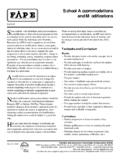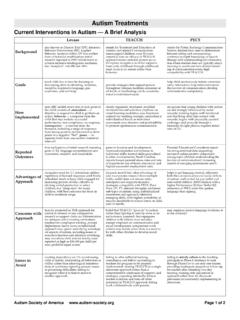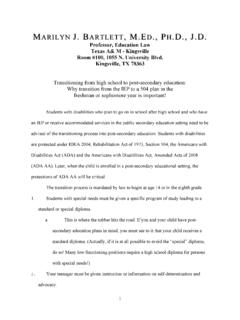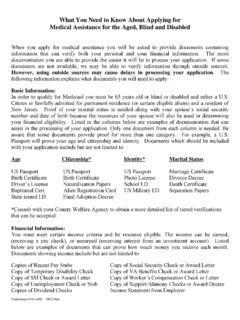Transcription of Choosing the Ideal Trustee of Your Child’s Special …
1 Choosing the Ideal Trustee of your child s Special Needs Trust By Stephen W. Dale I am a former psychiatric nurse of seventeen years who later became an attorney with the objective of fighting against abuse and neglect in large institutions. As my practice developed, my primary focus has been drafting and advising on Special Needs Trusts. This is a rapidly developing area of the law, and after watching hundreds of Special Needs Trusts under administration, I have come to the conclusion that the selection of a Trustee is the greatest factor in whether a Special Needs Trust succeeds or fails. To begin, let s review the mechanics of trusts in general and then focus on Special Needs Trusts specifically. The best way to understand how trusts work is to think of a trust as a contract. The most common type of trust today is the Living Trust, which is used to avoid probate. A Living Trust can avoid probate because the settlor (creator) of the trust designates where the trust s assets will pass to specific beneficiaries at a given time.
2 This usually occurs when the settlor dies. If you place your home in the trust or contract, the home passes to your heirs in accordance with your contract, not by state probate law, which allows families to avoid the costs and delays of probate. The central purpose of a Special Needs Trust is to set aside assets for a disabled beneficiary without elimination of the beneficiary s eligibility for needs based public benefits such as SSI or Medicaid. A Special Needs Trust can accomplish this because the Social Security Administration does not count Special Needs Trusts as assets of a SSI or Medicaid recipient. This is only the case if the Trustee has full discretion of time, purpose and amount of distributions. A Special Needs Trust works because the Trustee has the ability to deny any request even if the beneficiary s request is entirely reasonable. When parents create a Special Needs Trust for their son or daughter, they are creating a contract that is empowering the Trustee with the ability to never make a single distribution if the Trustee so desires.
3 As a Special Needs Trust attorney, my job is to create trusts that take the control of assets away from a disabled beneficiary, even if the beneficiary is capable of managing those assets. In many ways this is an insane thing to do to create a contract that tells a Trustee that they can take care of your child , or not take care of your child , at the Trustee s absolute discretion. When setting up a Special Needs Trust, parents should not take lightly the potential problem this creates. Choosing a Trustee of a Special Needs Trust Finding the Ideal Trustee is a near impossible task. This individual or entity would need to possess numerous skills on top of dedicating themselves entirely to the needs and advocacy of another for potentially the remainder of their own existence, and beyond. However, you can achieve success if you take all of the attributes of the Ideal Trustee and divide them into three categories. A system of checks and balances creates a stable trust administration formula and can do much more than protect public benefits.
4 Category One Financial Duties All trusts have certain duties concerning handling investments, tax planning and maintaining books. The discretionary nature of a Special Needs Trust intensifies those needs, especially when the beneficiary needs assistance advocating for their needs. Oddly enough, the Trustee may have no legal obligation to make a single distribution from the trust, but does have the duty to make prudent investments. The Trustee has a duty to oversee the investments in the trust and diversify them so that they are neither too conservative nor too aggressive. For example, if the Trustee of a $500,000 Special Needs Trust invested all of the funds in a Certificate of Deposit, receiving a one percent return, while a properly balanced portfolio would make a seven percent return, the Trustee could be liable to the trust for the difference. Contrarily, if the Trustee invested in risky growth funds and lost value in the trust, the Trustee would be responsible for the difference between the loss and expected rate of return, had the funds been properly invested.
5 This duty is governed by individual state laws, but the principal is pretty much universal. Category Two Personal Needs and Advocacy The second category is providing for the disabled beneficiary s personal needs. These needs include factoring how distributions will affect eligibility for public benefits, adhering to the ultimate intent of the trust document and, in many cases, advocating for the care and safety of the beneficiary. It is imperative that parents think beyond maintaining their child s eligibility for government benefits and think more broadly when creating an estate plan to provide for their child . Especially when the beneficiary may need assistance in advocating for their own needs. I believe the advocacy duties are the most important task of the Trustee . Whenever I think about this need, I remember a woman named Mrs. Miller who represents many mothers of children with disabilities. Mrs. Miller was an uncompromising advocate for her son David.
6 David had hydrocephalus, a condition where he could only be out of bed a couple of hours a day and he needed regular range of motion exercises to prevent contractures. It was extremely important that his beddings be dry at all times because his skin could deteriorate in a relatively short timeframe. Mrs. Miller had a habit of showing up at the unit any time of the day or night without notice. When she would enter the unit she would race to her son s room and place her hand on her son s bed to see if it was dry. On the rare occasion when the bed was not dry, Mrs. Miller would make a beeline for the nursing supervisors office and the nurse responsible for David that day would get severely reprimanded. Mrs. Miller passed away during my time in that unit and I remember the staff discussing their relief that she never put her hand on her sons bed again. Now, this was a very fine unit and he continued to receive top care, but in a lesser unit, without his mother s advocacy, this would be the beginning of declining care for David.
7 The Ideal Trustee must continue advocacy upon the parents incapacity or death. In other words, the Ideal Trustee makes sure the bed is dry for the remainder of the lifetime of the Special Needs Trust beneficiary. It may be very desirable to put a provision in the Special Needs Trust that when family or friends are unable or unwilling to visit the beneficiary, the Trustee should employ a private care manager to visit the beneficiary unannounced for the remainder of the beneficiary s life. Category Three Accountability and Keeping the Special Needs Trust on Track Accountability involves reviewing the activities of the Trustee and other advisors. If, for instance, the beneficiary of the Special Needs Trust is a 12-year-old boy with autism, it is very possible that he could live for another 75 years or longer. How likely is it that you can select a person or entity that can guarantee to meet his needs for the next 75 years?
8 In fact, what is the likelihood that the public benefits system and government programs that provide for his needs today will resemble the system 30 years from now? If we establish a checks and balance system, then someone should independently review the performance of the trust and have the power to replace any party that is not able or willing to meet the trust objectives. This person or entity can also amend the trust to conform to changes in the system and the law as time goes on. In some cases the person or entity might be an advisory committee of family, friends and professional care managers. This could also be what is called a Trust Protector a person or entity that has specific powers to amend or revise the trust as well as replace trustees. Family and Friends as Trustee There is always an inclination to appoint family members as successor-trustees of Special Needs Trusts. Many trusts fail because of ill equipped trustees, no matter how well intentioned.
9 While appointing a family member may be convenient and seem like the best thing to do, private professional trustees and even banks who serve as trustees often outperform family members in the same role. In addition, the need for attorney advisement and the risk of a benefits battle is greatly reduced when a trust is directed by an experienced professional Trustee . With the exception of smaller trusts, professionals are better equipped to handle the job. Generally speaking, most corporate trustees or banks require a minimum of $200,000 in a trust to be cost effective. California and other states have a developing profession of private professional fiduciaries, many who are experienced in the management of Special Needs Trusts and work on an hourly basis. This does not mean that family should not be included. This means only that they play more of a supervisory role. Let us look at three models that have proven effective.
10 Keep in mind that the right model depends on your child s needs and resources in your community. MODEL 1 The Trustee is Directed By A Trust Advisory Committee One very popular model is to have a corporate fiduciary, bank or private professional fiduciary, serve as Trustee , under the direction of an advisory committee. The committee would be comprised of one or two family members or friends and a trust adviser who can direct distributions by maximizing utilization of public benefits to meet the trusts overall objectives. There are a growing number of corporate trustees or banks that are doing a good job in administration of Special Needs Trusts. This is counterintuitive for many families and the image in their minds is an impersonal bank employee who doesn t know or care about their son or daughter. This has become big business for corporate trustees and they are becoming more competitive and responsive to meet this need.















